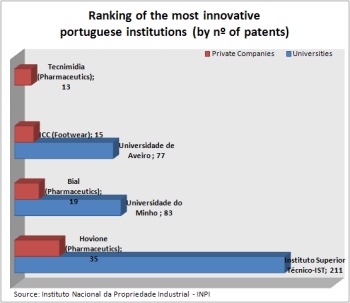Portuguese create 2 inventions per day
 From education to economics, bad news abound in the press, stories that highlight what is going wrong and studies that push Portugal down the ranks in development indexes are always given prominence. But, regarding creativity and innovation, it is a completely different story. Portuguese inventions are increasing at a tune of 40% per year since 2004. The increase is such that Portugal is already the country in the European Community with the highest increase in patent requests for the protection of inventions.
From education to economics, bad news abound in the press, stories that highlight what is going wrong and studies that push Portugal down the ranks in development indexes are always given prominence. But, regarding creativity and innovation, it is a completely different story. Portuguese inventions are increasing at a tune of 40% per year since 2004. The increase is such that Portugal is already the country in the European Community with the highest increase in patent requests for the protection of inventions.
From the discovery of new pharmaceuticals, intelligent irrigation systems, pain measurement systems to the creation of renewable energy equipments, varied are the industries that request a patent in the Instituto Nacional de Propriedade Industrial –INPI (National Industrial Property Institute). In 2009 alone, 723 applications were made, a record average of two per day.
António Campinos, president of the INPI, assures that Portuguese researchers are gaining greater relevance in the global marketplace, especially in high tech domains like chemistry, pharmaceutical, computers and telecoms, biotechnology and nanotechnology.
-“It is almost too good to be true, but regarding innovation and technology, Portugal is increasing at a rate very superior to the European average. In terms of Science, we already have a performance comparable to the most developed European countries” – concurs António Cruz Serra, president of the Instituto Superior Técnico-IST (Engineering, Science and Technology and Architecture Institute), the Portuguese institute for higher studies that holds the most patents.
Labs instead of pads
Many other schools are following the example of IST. In various universities and polytechnic institutes, the education is no longer made only with pens and pads, but each time more with test tubes. Leaving the classrooms behind, the Institutes are now turning to Investigation Centers and Laboratories.
-“There was a certain perception that the academic world was very theoretical, based solely on paper & pens, but this is changing drastically. Right now, there are over 1.100 doctoral students in the IST, something that was unthinkable three to four years ago. If I had set this number as an objective back then, everybody would have laughed at the idea” – exemplifies the president of the IST Institute .
Entrepreneurs & Innovation
-“There is a drastic change in attitude in the entrepreneurial world, especially among the young entrepreneurs. Portuguese companies are becoming more internationalized and have realized that the only way to compete in the global marketplace is through innovation and the protection of industrial property” – clarifies António Câmara, university professor and founder of Ydreams, a firm specialized in collaborative working technologies, that has already developed over 500 projects worldwide.
Crisis sparks imagination
-“More investigation is carried during periods of depression. The same occurred in 2002, when we went through another crisis. During these demanding periods the number of companies that contact universities for projects of investigation is always greater because entrepreneurs understand that this is the best way to grow and to resist crisis” – says the president of the IST.
According to António Campinos, of the INPI, there is a simple logic to it. If an invention is always the answer to a problem or to a shortcoming (and in crisis periods, the deficiencies are greater), than it is in those periods that there is more creativity and incentive to innovate. Preference is given to solutions that lower production costs and increase sales. -“It is known that necessity is the mother of invention. This couldn’t be more true. Especially in a country like Portugal, that lacks raw materials. The only way out is the output of our brains.”
Examples of Portuguese Patents
IST- From space down to house roofs
It is considered the most valuable patent of the Instituo Superior Técnico-IST and is on its way to cause an impact in the construction industry as did concrete. Investigators found a new way to produce aerogel, considered to be the world’s lightest solid and the best thermal, acoustic and electric insulation material available. Production of aerogel is so expensive that it is mainly used in aeronautics and by NASA in the construction of spaceships. However the invention of Portuguese investigators will allow to produce it at the cost of styrofoam, explains Luis Caldas de Oliveira, professor at IST. The new form of production combines aerogel with latex, making it more malleable, easier to work with and cheaper. The IST, which already had the national and European patents, obtained the rights for the U.S. and Brazil this year. Various foreign companies showed interest in buying the product and the IST is now looking for an industrial partner who can produce it. This invention has a large scale of application in the build and construction sector, replacing all thermal insulation materials used until now. –“This is why the economic potential is simply unimaginable”, assures Luis Caldas de Oliveira.
Bial Pharmaceutics – First medicinal product 100% Portuguese
The research for the anti-epileptic Zebinix, the first medicinal product totally developed in Portugal, began in the nineties, but only started to be commercialized this year in pharmacies in Portugal and in the rest of Europe. Studies show that 65% of the patients reduced at least to half the number of epileptic crisis. Bial, which invested 300 million euros in this research, holds the European patent and has already required the patent for the U.S. and Canada, where it will also be commercialized.
Ambisig – The intelligent irrigation solution
To maintain the grass always green and the flowers always blooming is not easy. The automatic irrigation systems are there to help, despite being very inefficient in terms of water consumption – at least they were until now. This is where the Portuguese company Ambisig, specialized in data management and geographical information systems, shows their expertise with the invention of an intelligent system that receives all meteorological data through radio frequency emitters and processes it by means of chips. If the weather is hot, the irrigation flow will increase but if it rains, the system shuts off. The system can also be adjusted to the type of flowers grown in the garden, allowing a reduction in water consumption of approximately 50%. The national patent was obtained this year.
University of Beira Interior – Pain measurement
Imagine that you are sitting in a hospital and cannot speak to inform the doctor about the pain that you are feeling. The lack of communication can compromise the diagnosis and the treatment. To overcome this type of situation, researchers from the Universidade da Beira Interior (University of Beira Interior) created a system that measures pain intensity. To transmit the pain felt, the patient presses a sensor, connected to a computer with a specific software that allows to decode the “message” in a set of signs visible in a monitor and audible in a speaker.
Via Verde – Pioneer invention that never was patented
 It is considered one of the major inventions made in Portugal in the last years, but never was patented. In the beginning of the nineties, Brisa, the largest highway concessionaire in Portugal, created the Via Verde (“Green route“) and became the first company in the world to develop an automatic toll system that was applicable in all the national territory, independently of the concessionaire of the highway used, of the access or exit point or of the banking institution associated to the driver’s account. The radiofrequency technology was of Norwegian origin, but the idea to apply it to toll highways, by means of an antenna and an identifier was Portuguese and the world’s first. However, the company didn’t retain any of the rights over the invention since it never applied for a patent. –“We didn’t apply for a patent because at the time, the registry of patents was very incipient and there was a lack of knowledge about how to handle the process. It really was a pity,” lamented Jorge Sales Gomes, Director of Innovation with Brisa. Pity is an understatement, because if it had the international patent of the invention, -“Brisa would be one of the world leaders in its industry”, assures António Campinos, president of the INPI (National Industrial Property Institute). This is sustained by the fact that still today, Brisa is contacted every month by managers from all over the world – from the U.S. to Australia, from Brazil to South Africa – interested in better understanding how the system works so that it can be applied in their countries as well. But the company has learned the lesson. Now it has lawyers specialized in patents and a Department of Innovation that works with a network of 60 researchers. It has just been awarded a patent of a system that automatically recognizes license plates for electronic payment of tolls and has already requested an extension of rights to the U.S. and to all of the European market.
It is considered one of the major inventions made in Portugal in the last years, but never was patented. In the beginning of the nineties, Brisa, the largest highway concessionaire in Portugal, created the Via Verde (“Green route“) and became the first company in the world to develop an automatic toll system that was applicable in all the national territory, independently of the concessionaire of the highway used, of the access or exit point or of the banking institution associated to the driver’s account. The radiofrequency technology was of Norwegian origin, but the idea to apply it to toll highways, by means of an antenna and an identifier was Portuguese and the world’s first. However, the company didn’t retain any of the rights over the invention since it never applied for a patent. –“We didn’t apply for a patent because at the time, the registry of patents was very incipient and there was a lack of knowledge about how to handle the process. It really was a pity,” lamented Jorge Sales Gomes, Director of Innovation with Brisa. Pity is an understatement, because if it had the international patent of the invention, -“Brisa would be one of the world leaders in its industry”, assures António Campinos, president of the INPI (National Industrial Property Institute). This is sustained by the fact that still today, Brisa is contacted every month by managers from all over the world – from the U.S. to Australia, from Brazil to South Africa – interested in better understanding how the system works so that it can be applied in their countries as well. But the company has learned the lesson. Now it has lawyers specialized in patents and a Department of Innovation that works with a network of 60 researchers. It has just been awarded a patent of a system that automatically recognizes license plates for electronic payment of tolls and has already requested an extension of rights to the U.S. and to all of the European market.
Image credit of Gyro Gearloose: wikipedia.org
(translated by BestInPortugal.com under permission of the author, Joana Pereira Bastos jbastos@expresso.impresa.pt )


{ 3 trackbacks }